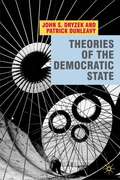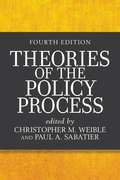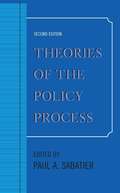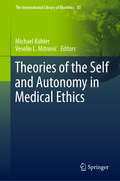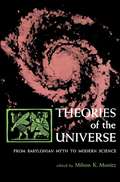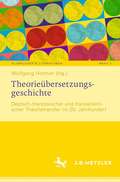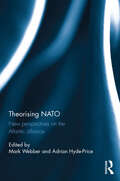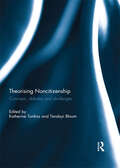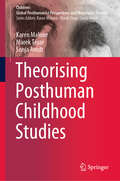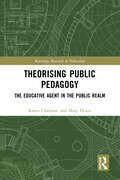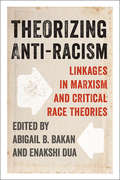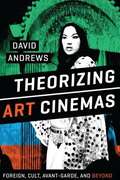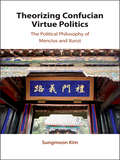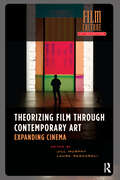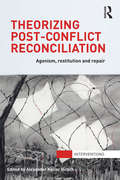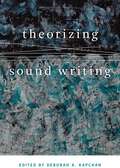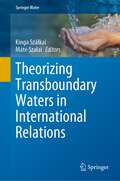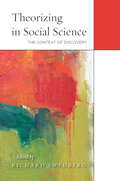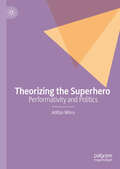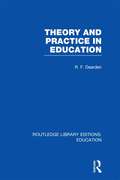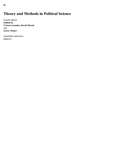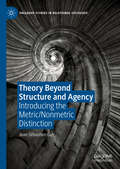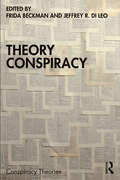- Table View
- List View
Theories of the Democratic State
by John S. Dryzek Patrick DunleavyWe live in a world governed by states whose enduring importance and domination of contemporary politics has been strikingly underlined by their renewed activism in the face of a global economic crisis. Yet the very nature of states remains deeply contested, with a range of competing theories offering very different views of how they actually do or should operate. In the past this competition has lead to deep ideological conflict - and even to war. In this major new work, John S. Dryzek and Patrick Dunleavy provide a broad-ranging assessment of classical and contemporary theories of the state, focusing primarily on the democratic state form that has come to dominate modern politics. The authors' starting point is the classical theories of the state: pluralism, elite theory, Marxism and market liberalism. They then turn to the contemporary forms of pluralism prevalent in political science, systematically exploring how they address central issues, such as networked governance, globalization, and changing patterns of electoral and identity politics. They proceed to analyse a range of key contemporary critiques of modern states and democracy that have emerged from feminism, environmentalism, neo-conservatism and post-modernism. Each approach is carefully introduced and analysed as far as possible in relation to a common set of issues and headings. Theories of the Democratic State takes the reader straight to the heart of contemporary issues and debates and, in the process, provides a challenging and distinctive introduction to and reassessment of contemporary political science.
Theories of the Policy Process
by Paul A Sabatier Christopher M WeibleA comprehensive primer to the major contemporary theoretical frameworks used in policy process research written by leading public policy scholars.
Theories of the Policy Process
by Paul A SabatierTheories of the Policy Process provides a forum for the proponents of several of the most promising and widely used theoretical frameworks to present the basic propositions of their frameworks, to assess the empirical evidence that has developed, and to discuss promising directions for future research. The first edition contained analyses of Institutional Rational Choice (Ostrom), Multiple Streams (Zahariadis), Punctuated Equilibrium (Jones et al.), Advocacy Coalition Framework (Sabatier and Jenkins-Smith), and Policy Diffusion (Berry and Berry). The second edition revises these and adds new chapters on Social Construction and Policy Design (Schneider et al.) and Policy Networks (Adam and Kriesi). It also contains a much more serious analysis of the European literature relevant to each of the frameworks. Finally, the new edition contains a revised chapter by Edella Schlager, presenting a comparative analysis and evaluation of the relevant frameworks, and a concluding chapter by the editor suggesting a number of strategies for improving the state of theorizing in this field.
Theories of the Policy Process, Second Edition
by Paul A. SabatierTheories of the Policy Process provides a forum for the proponents of several of the most promising and widely used theoretical frameworks to present the basic propositions of their frameworks, to assess the empirical evidence that has developed, and to discuss promising directions for future research. The first edition contained analyses of Institutional Rational Choice (Ostrom), Multiple Streams (Zahariadis), Punctuated Equilibrium (Jones et al.), Advocacy Coalition Framework (Sabatier and Jenkins-Smith), and Policy Diffusion (Berry and Berry). The second edition revises these and adds new chapters on Social Construction and Policy Design (Schneider et al.) and Policy Networks (Adam and Kriesi). It also contains a much more serious analysis of the European literature relevant to each of the frameworks. Finally, the new edition contains a revised chapter by Edella Schlager, presenting a comparative analysis and evaluation of the relevant frameworks, and a concluding chapter by the editor suggesting a number of strategies for improving the state of theorizing in this field.
Theories of the Self and Autonomy in Medical Ethics (The International Library of Bioethics #83)
by Michael Kühler Veselin L. MitrovićThis book engages in a critical discussion on how to respect and promote patients’ autonomy in difficult cases such as palliative care and end-of-life decisions. These cases pose specific epistemic, normative, and practical problems, and the book elucidates the connection between the practical implications of the theoretical debate on respecting autonomy, on the one hand, and specific questions and challenges that arise in medical practice, on the other hand. Given that the idea of personal autonomy includes the notion of authenticity as one of its core components, the book explicitly includes discussions on underlying theories of the self. In doing so, it brings together original contributions and novel insights for “applied” scenarios based on interdisciplinary collaboration between German and Serbian scholars from philosophy, sociology, and law. It is of benefit to anyone cherishing autonomy in medical ethics and medical practice.
Theories of the Universe
by Milton K. MunitzThe theoretical physicist shares his latest thoughts on the nature of space and time in this anthology of selections from Princeton University Press. Along with eminent colleagues, Hawking extends theoretical frontiers by speculating on the big questions of modern cosmology.
Theorieübersetzungsgeschichte: Deutsch-französischer und transatlantischer Theorietransfer im 20. Jahrhundert (Globalisierte Literaturen. Theorie und Geschichte transnationaler Buchkultur / Globalized Literatures. Theory and History of Transnational Book Culture #2)
by Wolfgang HottnerIm Zuge der Historisierung von Theorie ist die Rolle von Übersetzungen sowie die vermittelnde Rolle der Übersetzer*innen bisher nur am Rande berücksichtigt worden. Doch für die Rezeption, Internationalisierung und Kanonisierung von Theorie spielen diese eine entscheidende Rolle, weshalb sich dieser Band der Geschichte der Theorie in Hinblick auf ihre Übersetzungen nähert. Die Brisanz, die Theorie in Deutschland, Frankreich und den USA von Anfang der 1960er bis Ende der 1990er Jahre entfalten konnte, verdankt sich nicht nur der Mobilität ihrer Protagonist*innen, sondern auch der Verfügbarkeit von Übersetzungen, in denen Theorie von einer Sprache in die andere übergeht, dabei ‚anschlussfähig‘ wird. Theorieübersetzungsgeschichte rückt die Arbeit von Übersetzer*innen in den Blick, die wechselseitige Beziehung von Übersetzungstheorie und poststrukturalistisch-dekonstruktivem Denken sowie ein spezifisches Verständnis von Übersetzung, das mit dem Anspruch verbunden ist, im Verlauf gegenwärtiger Debatten zu intervenieren.
Theorising NATO: New perspectives on the Atlantic alliance
by Mark Webber Adrian Hyde-PriceScholarship on NATO is often preoccupied with key episodes in the development of the organisation and so, for the most part, has remained inattentive to theory. This book addresses that gap in the literature. It provides a comprehensive analysis of NATO through a range of theoretical perspectives that includes realism, liberalism and constructivism, and lesser-known approaches centred on learning, public goods, securitisation and risk. Focusing on NATO's post-Cold War development, it considers the conceptualisation, purpose and future of the Alliance. This book will be of interest to students and scholars of international organisation, international relations, security and European Politics.
Theorising Noncitizenship: Concepts, Debates and Challenges
by Katherine Tonkiss and Tendayi Bloom‘Noncitizenship’, if it is considered at all, is generally seen only as the negation or deprivation of citizenship. It is rarely examined in its own right, whether in relation to States, to noncitizens, or citizens. This means that it is difficult to examine successfully the status of noncitizens, obligations towards them, and the nature of their role in political systems. As a result, not only are there theoretical black holes, but also the real world difficulties created as a result of noncitizenship are not currently successfully addressed. In response, Theorising Noncitizenship seeks to define the theoretical challenge that noncitizenship presents and to consider why it should be seen as a foundational concept in social science. The contributions, from leading scholars in the field and across disciplinary backgrounds, capture a diversity of perspectives on the meaning, position and lived experience of noncitizenship. They demonstrate that, we need to look beyond citizenship in order to take noncitizenship seriously and to capture fully the lived realities of the contemporary State system. This book was previously published as a special issue of Citizenship Studies.
Theorising Play in the Early Years
by Marilyn FleerTheorising Play in the Early Years is a theoretical and empirical exploration of the concept of pedagogy and play in early childhood education. The book provides an in-depth examination of classical and contemporary theories of play, with a focus on post-developmental perspectives and Vygotskian theory. In this book, Marilyn Fleer draws on a range of cross-cultural research in order to challenge Western perspectives and to move beyond a universal view of the construct of play. Culture and context are central to the understanding of how play is valued, expressed and used as a pedagogical approach in early childhood education across the international community. Designed as a companion to the textbook Play in the Early Years, but also useful on its own, Theorising Play in the Early Years provides indispensable support to academics and TAFE lecturers in early childhood education in their course development and research.
Theorising Posthuman Childhood Studies (Children: Global Posthumanist Perspectives and Materialist Theories)
by Marek Tesar Karen Malone Sonja ArndtThis book is a genealogical foregrounding and performance of conceptions of children and their childhoods over time. We acknowledge that children’s lives are embedded in worlds both inside and outside of structured schooling or institutional settings, and that this relationality informs how we think about what it means to be a child living and experiencing childhood. The book maps the field by taking up a cross-disciplinary, genealogical niche to offer both an introduction to theoretical underpinnings of emerging theories and concepts, and to provide hands-on examples of how they might play out. This book positions children and their everyday lived childhoods in the Anthropocene and focuses on the interface of children’s being in the everyday spaces and places of contemporary communities and societies. In particular this book examines how the shift towards posthuman and new materialist perspectives continues to challenge dominant developmental, social constructivist and structuralist theoretical approaches in diverse ways, to help us to understand contemporary constructions of childhoods. It recognises that while such dominant approaches have long been shown to limit the complexity of what it means to be a child living in the contemporary world, the traditions of many Eurocentric theories have not addressed the diversity of children’s lives in the majority of countries or in the Global South.
Theorising Public Pedagogy: The Educative Agent in the Public Realm (Routledge Research in Education)
by Mary Dixon Karen CharmanDrawing on the ideas of Hannah Arendt and Michel Foucault, this book extends the theoretical understanding of public pedagogy and brings into sharp focus the elements that constitute the public realm; the site of public pedagogy. Karen Charman and Mary Dixon offer a new theorisation of the public, a term at the heart of debate in the field, heightened in this post-truth era by the COVID-19 pandemic, the rise of fake news and the technological reconfigurations of public life. The new theorization addresses the ‘public’, ‘pedagogy’ and their confluence in ‘public pedagogy’. The book explores a deep engagement with the architecture and dynamics of pedagogy and argues for the positioning of pedagogy with the public. The authors contribute to a theorisation that re-considers the individual and their capacity for agency within the public realm. The book presents knowledge and pedagogical encounters as key elements of public pedagogy and most significantly, the educative agent as a means of critically rethinking social life and learning in public spaces. Presenting an innovative theoretical approach, this book will be of interest to academics in the fields of public and critical pedagogy and postgraduate students in education, cultural studies and politics.
Theorizing Anti-Racism
by Enakshi Dua Abigail Bakanp>Over the last few decades, critical theory which examines issues of race and racism has flourished. However, most of this work falls on one side or the other of a theoretical divide between theory inspired by Marxist approaches to race and racism and that inspired by postcolonial and critical race theory. Driven by the need to move beyond the divide, the contributors to Theorizing Anti-Racism present insightful essays that engage these two intellectual traditions with a focus on clarification and points of convergence.The essays in Theorizing Anti-Racism examine topics which range from reconsiderations of anti-racism in the work of Marx and Foucault to examinations of the relationships among race, class, and the state that integrate both Marxist and critical race theory. Drawing on the most constructive elements of Marxism and postcolonial and critical race theory, this collection constitutes an important contribution to the advancement of anti-racist theory.
Theorizing Art Cinemas: Foreign, Cult, Avant-Garde, and Beyond
by David AndrewsThe term "art cinema" has been applied to many cinematic projects, including the film d'art m ovement, t he p ostwar a vantgardes, various Asian new waves, the New Hollywood, and American indie films, but until now no one has actually defined what "art cinema" is. Turning the traditional, highbrow notion of art cinema on its head, Theorizing Art Cinemas takes a flexible, inclusive approach that views art cinema as a predictable way of valuing movies as "art" movies--an activity that has occurred across film history and across film subcultures--rather than as a traditional genre in the sense of a distinct set of forms or a closed historical period or movement. David Andrews opens with a history of the art cinema "supergenre" from the early days of silent movies to the postwar European invasion that brought Italian Neorealism, the French New Wave, and the New German Cinema to the forefront and led to the development of auteur theory. He then discusses the mechanics of art cinema, from art houses, film festivals, and the academic discipline of film studies, to the audiences and distribution systems for art cinema as a whole. This wide-ranging approach allows Andrews to develop a theory that encompasses both the high and low ends of art cinema in all of its different aspects, including world cinema, avant-garde films, experimental films, and cult cinema. All of these art cinemas, according to Andrews, share an emphasis on quality, authorship, and anticommercialism, whether the film in question is film festival favorite or a midnight movie.
Theorizing Confucian Virtue Politics: The Political Philosophy of Mencius and Xunzi
by Sungmoon KimSurprisingly little is known about what ancient Confucian thinkers struggled with in their own social and political contexts and how these struggles contributed to the establishment and further development of classical Confucian political theory. Leading scholar of comparative political theory, Sungmoon Kim offers a systematic philosophical account of the political theories of Mencius and Xunzi, investigating both their agreements and disagreements as the champions of the Confucian Way against the backdrop of the prevailing realpolitik of the late Warring States period. Together, they contributed to the formation of Confucian virtue politics, in which concerns about political order and stability and concerns about moral character and moral enhancement are deeply intertwined. By presenting their political philosophies in terms of constitutionalism, Kim shows how they each developed the ability to authorize the ruler's legitimate use of power in domestic and interstate politics in ways consistent with their distinctive accounts of human nature.
Theorizing Film Through Contemporary Art: Expanding Cinema (Film Culture in Transition)
by Jill Murphy Laura RascaroliAs the cinematic experience becomes subsumed into today's ubiquitous technologies of seeing, contemporary artworks lift the cinematic out of the immateriality of the film screen and separate it into its physical components within the gallery space. How to read these reformulations of the cinematic medium - and their critique of what it is and has been? In Theorizing Cinema Through Contemporary Art: Expanding Cinema, leading film theorists consider artworks that incorporate, restage, and re-present cinema's configuration of the key categories of space, experience, presence/absence, production and consumption, technology, myth, perception, event, and temporality, so interrogating the creation, appraisal, and evolution of film theory as channeled through contemporary art. This book takes film theory as a blueprint for the moving image, and juxtaposes it with artworks that render cinema as a material object. In the process, it unfolds a complex relationship between a theory and a practice that have commonly been seen as virtually incompatible, renewing our understanding of each and, more to the point, their interactions.
Theorizing Post-Conflict Reconciliation: Agonism, Restitution & Repair (Interventions)
by Alexander Keller HirschThe founding of truth commissions, legal tribunals, and public confessionals in places like South Africa, Australia, Yugoslavia, and Chile have attempted to heal wounds and bring about reconciliation in societies divided by a history of violence and conflict. This volume asks how many of the popular conclusions reached by transitional justice studies fall short, or worse, unwittingly perpetuate the very injustices they aim to suture. Though often well intentioned, these approaches generally resolve in an injunction to "move on," as it were; to leave the painful past behind in the name of a conciliatory future. Through collective acts of apology and forgiveness, so the argument goes, reparation and restoration are imparted, and the writhing conflict of the past is substituted for by the overlapping consensus of community. And yet all too often, the authors of this study maintain, the work done in assuaging past discord serves to further debase and politically neutralize especially the victims of abuse in need of reconciliation and repair in the first place. Drawing on a wide range of case studies, from South Africa to Northern Ireland, Bosnia, Rwanda and Australia, the authors argue for an alternative approach to post-conflict thought. In so doing, they find inspiration in the vision of politics rendered by new pluralist, new realist, and especially agonistic political theory. Featuring contributions from both up and coming and well-established scholars this work is essential reading for all those with an interest in restorative justice, conflict resolution and peace studies.
Theorizing Sound Writing
by Deborah KapchanThe study of listening—aurality—and its relation to writing is the subject of this eclectic edited volume. Theorizing Sound Writing explores the relationship between sound, theory, language, and inscription. This volume contains an impressive lineup of scholars from anthropology, ethnomusicology, musicology, performance, and sound studies. The contributors write about sound in their ongoing work, while also making an intervention into the ethics of academic knowledge, one in which listening is the first step not only in translating sound into words but also in compassionate scholarship.
Theorizing Transboundary Waters in International Relations (Springer Water)
by Máté Szalai Kinga SzálkaiThis book is the first collection of state-of-the-art research projects analyzing water conflict and cooperation with an explicitly theoretical point of view. Its fourteen chapters offer a comprehensive and up-to-date overview on how the application of various theoretical perspectives can support the work of scholars and practitioners in mitigating water conflict and developing cooperation.The volume starts out from a literature review on the theorization of transboundary waters in International Relations, which prepares the ground for the demonstration of the latest approaches of scholars currently working on this field. The discussion of their findings is divided into four main sections. The first section deals with reflections and critiques on the grand theories of International Relations, proposing new and more nuanced frameworks for understanding and managing transboundary water relations by going beyond the traditional assumptions. The second section focuses on the catalysts and barriers of cooperation, applying theoretical frameworks which reveal the consequences of the dynamics in power relations and institutional frameworks. The third section investigates into the perspectives at the intersections of theory and practice related to the most practical field within the scope of the volume: water diplomacy. The fourth section introduces new perspectives to provide specific entry points for understanding and managing water conflict and cooperation.Overall, the work intends to demonstrate that the theorization of transboundary waters can significantly contribute to the deeper understanding and the more efficient management of water conflicts and cooperation from several aspects.The authors come from diverse backgrounds, and their individual careers are often related to the intersections of theory and practice in the field of transboundary water management. Their expertise covers water issues from all around the globe, which is reflected in the range of the analyzed case studies. The diversity of the experts involved, their backgrounds, their perspectives, the applied theories, and the analyzed cases was an important priority for the editors.
Theorizing in Social Science: The Context of Discovery
by Richard SwedbergAll social scientists learn the celebrated theories and frameworks of their predecessors, using them to inform their own research and observations. But before there can be theory, there must be theorizing. Theorizing in Social Science introduces the reader to the next generation of theory construction and suggests useful ways for creating social theory. What makes certain types of theories creative, and how does one go about theorizing in a creative way? The contributors to this landmark collection#151;top social scientists in the fields of sociology, economics, and management#151;draw on personal experiences and new findings to provide a range of answers to these questions. Some turn to cognitive psychology and neuroscience's impact on our understanding of human thought, others encourage greater dialogue between and across the arts and sciences, while still others focus on the processes by which observation leads to conceptualization. Taken together, however, the chapters collectively and actively encourage a shift in the place of theory in social science today. Appealing to students and scientists across disciplines, this collection will inspire innovative approaches to producing, teaching, and learning theory.
Theorizing the Superhero: Performativity and Politics
by Aditya MisraThis book uses contemporary continental philosophy to develop an alternative theory of the superhero to the one currently offered by the comic book industry and comic book studies. Studying superheroes from South Asian pop culture, this book questions the definition of the superhero and the allegedly sacrosanct nature of its origin and identity in comic books. This book looks at the superhero as a performative figure and explores how the superheroic imagination opens up diverse modes of creative thinking. Superheroes studied in this book include Narayan Debnath’s Bantul the Great (comics), Premendra Mitra’s Ghanashyam Das or Ghanada (Tall Tale), Satyajit Ray’s Professor Trilokeswar Shonku (science fiction/fantasy fiction), and one of the nine gems of Emperor Akbar’s court, Raja Birbar or Birbal (mediaeval Indian history). By virtue of perpetual reconfiguration of its elements, the book argues, the concept of the superhero makes itself ‘always new’ and it is always already ‘open onto elsewhere’.
Theory & Practice in Education (Routledge Library Editions: Education)
by R. F. DeardenThe main concern of the volume is the relation of theory to practice in education but the book also reviews the state of educational theory, and its relation to politics. Beginning with a group of papers on specific areas of the relation between theory and practice, the book goes on to discuss aspects of the curriculum, such as curricular principles in recent official reports, the newly emerging theme of general abilities, and controversial material in the curriculum. The theme of the third group of articles is personal autonomy, one of the very few generally supported educational aims of recent years, and a final group presents a retrospective view of the Plowden Report.
Theory And Methods In Political Science (Political Analysis Ser. #21)
by David Marsh Gerry Stoker Vivien LowndesA broad-ranging and pluralistic textbook which highlights the rich variety of approaches to studying politics. Written by an international team of experts, this fully revised fourth edition offers cutting-edge coverage from fundamental to contemporary issues. Integrating guides to further reading and clear examples of how research methods can be applied, it enables readers to feel confident about taking their study of politics forward.
Theory Beyond Structure and Agency: Introducing the Metric/Nonmetric Distinction (Palgrave Studies in Relational Sociology)
by Jean-Sébastien GuyThis book offers a solution for the problem of structure and agency in sociological theory by developing a new pair of fundamental concepts: metric and nonmetric. Nonmetric forms, arising in a crowd made out of innumerable individuals, correspond to social groups that divide the many individuals in the crowd into insiders and outsiders. Metric forms correspond to congested zones like traffic jams on a highway: individuals are constantly entering and leaving these zones so that they continue to exist, even though the individuals passing through them change. Building from these concepts, we can understand “agency” as a requirement for group identity and group membership, thus associating it with nonmetric forms, and “structure” as a building-up effect following the accumulation of metric forms. This reveals the contradiction between structure and agency to be a case of forced perspective, leaving us victim to an optical illusion.
Theory Conspiracy (Conspiracy Theories)
by Frida Beckman Di Leo, Jeffrey R.Theory Conspiracy provides a state-of-the-art collection that takes stage on the meeting and/or battlegrounds between conspiracy theory and theory-asconspiracy. By deliberately scrambling the syntax—conspiracy theory cum theory conspiracy—it seeks to open a set of reflections on the articulation between theory and conspiracy that addresses how conspiracy might rattle the sense of theory as such. In this sense, the volume also inevitably stumbles on the recent debates on postcritique. The suspicion that our ways of reading in the humanities have been far too suspicious, if not paranoid, has gained considerable attention in a humanities continuously questioned as superfluous at best and leftist and dangerous at worst. The chapters in this volume all approach this problematic from different angles. It features clear engaging writing by a set of contributors who have published extensively on questions of paranoia, conspiracy theory, and/or the state of theory today. This collection will appeal to readers interested in conspiracy theories, critical theory, and the future of humanities.
